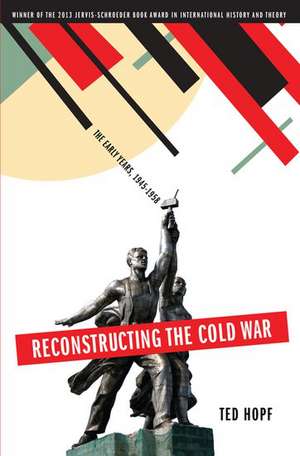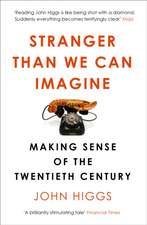Reconstructing the Cold War: The Early Years, 1945-1958
Autor Ted Hopfen Limba Engleză Paperback – 17 apr 2014
| Toate formatele și edițiile | Preț | Express |
|---|---|---|
| Paperback (1) | 274.51 lei 31-37 zile | |
| Oxford University Press – 17 apr 2014 | 274.51 lei 31-37 zile | |
| Hardback (1) | 359.59 lei 31-37 zile | |
| Oxford University Press – 31 mai 2012 | 359.59 lei 31-37 zile |
Preț: 274.51 lei
Preț vechi: 288.81 lei
-5% Nou
Puncte Express: 412
Preț estimativ în valută:
52.53€ • 54.27$ • 43.72£
52.53€ • 54.27$ • 43.72£
Carte tipărită la comandă
Livrare economică 15-21 martie
Preluare comenzi: 021 569.72.76
Specificații
ISBN-13: 9780199379767
ISBN-10: 0199379769
Pagini: 320
Dimensiuni: 231 x 155 x 20 mm
Greutate: 0.45 kg
Editura: Oxford University Press
Colecția OUP USA
Locul publicării:New York, United States
ISBN-10: 0199379769
Pagini: 320
Dimensiuni: 231 x 155 x 20 mm
Greutate: 0.45 kg
Editura: Oxford University Press
Colecția OUP USA
Locul publicării:New York, United States
Recenzii
Ted Hopf uses a sophisticated and nuanced societal constructivist approach to illuminate Soviet understandings and motivations in the years of the Cold War. By combining discursive analysis with a serious investigation of institutions, he demonstrates that the Stalinist state discourse of capitalist danger to state socialism, which dominated in official views until Stalin's death in 1953, was replaced by an alternative discourse of difference that allowed for greater variety and tolerance within the socialist camp. Taking identities as fundamental to foreign policy, Hopf illustrates their profound effects on the choices made by the Soviet leaders. From his unique perspective, he is able to go beyond conventional neorealist accounts and lay out an original new approach to understanding the origins of the Cold War. This is a work that breaks through the impasses of old-style Sovietology and enlivens our debates and understanding.
Notă biografică
Ted Hopf is Professor of Political Science at the National University of Singapore. He is the author or editor of five books, including Social Construction of International Politics: Identities and Foreign nPolicies, Moscow, 1955 and 1999 (Cornell 2002), which won the 2003 Marshall D. Shulman Award, presented by the American Association for the Advancement of Slavic Studies for the best book published that year on the international politics of the former Soviet Union and Central Europe. Hopf received his B.A. from Princeton University in 1983 and Ph.D. from Columbia University in 1989. He was a Fulbright Professor in the autumn of 2001 at the European University at St. Petersburg. His research has been supported by the Ford Foundation, the Olin and Davis Centers at Harvard University, and The Mershon Center at Ohio State University.













